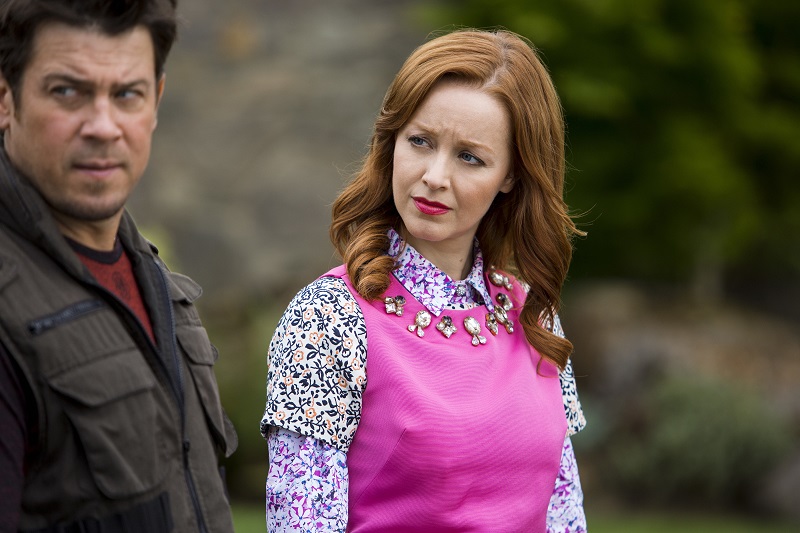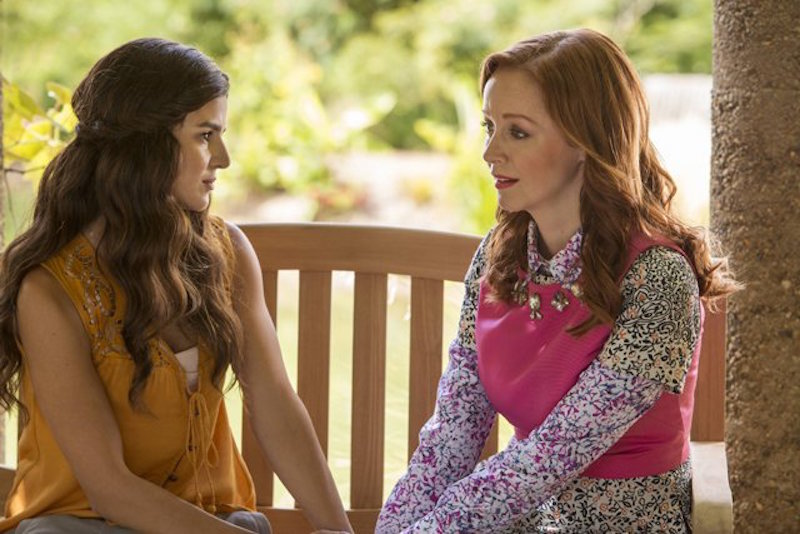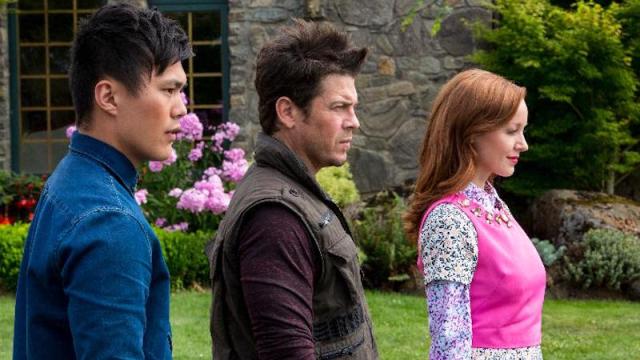Are you not watching The Librarians? It’s still the most fun you’ll have Wednesday nights, with the latest episode combining zany vampire antics with some truly heartbreaking scenes confronting mortality. We talked to actress Lindy Booth, who plays Cassandra, about everything that happened in one of the show’s finest episodes.
Image: TNT

In “And the Eternal Question”, Cassandra is told that she needs surgery because her tumour has finally reached the point where it will kill her, not in the distant future, but very soon. She rejects the surgery, hides the new diagnosis from her team and throws herself into the newest mission. The mission takes them to a compound of vampires that can walk in the sun and who run a retreat where they help the sick. One of the vampires in charge, Estrella (Clara Lago), can see that Cassandra is sick and offers to turn Cassandra so that she won’t die.
Cassandra is attracted by the offer and finds herself defending the vampires against her team. She also asks out Jenkins (John Larroquette), who turns her down very gently, while reminding both her and us that he’s an immortal who served King Arthur and still loves the woman he swore an oath to centuries ago.
At the end of the day, some of the vampires were evil, but not the one that offered to turn Cassandra. She ultimately chooses to undergo the surgery her doctor recommended; she’s saved, and thankfully it doesn’t take away her gift with numbers.
It was obviously a huge Cassandra episode, and we had a lot of questions for Lindy Booth about her character’s choices and feelings in the episode.
Gizmodo: Last night was the end of something that’s been a huge part of this character for two, almost three, seasons now.
Lindy Booth: We started talking about this episode before this season even started. And it has been something that’s been floating, this very real problem that she has and how do we deal with it, especially on a show that deals with magic and vampires. How do we fit this reality with the sort of escapism of the show?
And I just have to give full credit to our beautiful writers. I had multiple sit-downs with Kate Rorick about it. And I think she and Nicole [Ranadive] did such a beautiful job of making it real and keeping it real and still living in the world, and it still manages to be a super fun and interesting episode.
It feels like this isn’t the first time Cassandra has been tempted by a magical solution. To have it come up again really feels like it’s a weakness she’s had this whole time. Do you agree?
Booth: I think that’s the thing. When you’re given a terminal diagnosis and you’re constantly being told there’s nothing we can do, there’s no hope, what you need is magic. And this character lives in a world where magic is a very real possibility to cure her and to relieve her of this problem and to give her life back. So, I think people who have been sick can relate to that because sometimes magic is all you have to hope for. And this character just happens to live in a world where that’s a reality for her.
But I love the way that Kate and Nicole wrote this. That she goes through the stages of grieving and I think that’s a very realistic way to look at it. When you are faced with a terminal diagnosis, you grieve for yourself before you’re gone, before you do the bargaining and the anger, you mourn. And I think the girls did a beautiful job writing that and really bringing that alive. And I think that really helped me connect to the guts of what she was going through.
What was Cassandra’s reason for hiding how bad it was getting from the rest of the team?
Booth: That thing is a very Cassandra thing to do. I didn’t even question it, really. To me, she’s trying to protect her friends and it’s one of those misguided things that you do when you don’t know how to deal with it, so you don’t want to put it on other people, and so she just ignores it. She doesn’t want them to have to be burdened with that.
I think a lot of it has to do with the fact that she knows what they’re in the middle of. That there are these final two episodes that are this battle between good and evil, this culmination of all of their work. She knows that’s coming, so she knows that’s where they should be focused. So she’s not trying to steal the thunder and distract them from what needs to be done because I think she does her job as a Librarian very seriously and she doesn’t want to distract the others from what they need to do.

Image: TNT
Two moments that really stood out for me last night. The first was Cassandra overcompensating after her diagnosis by being super-cheerful at work.
Booth: Yeah, caffeinated Cassandra was something we all had a good deal of fun with. I was super excited to play it because Cassandra’s level of enthusiasm is often a little elevated, so the idea of taking this girl who is already sort of living in her own world and punch it up a notch was super fun for me.
We had a great time with wardrobe, like we always do, with this idea of caffeinated Cassandra and her being like, “I’m going to wear all of the patterns and all of the colours.” And the first time we showed the producers that outfit, they were like, “I don’t know, it seems like it’s a bit much.” And I was like, “This is where she is right now.” And I really fought for that look because I was like, this is where she is, she is on overload and she is trying to wear all of the colours she can while she’s got time left. And Noah Wyle said he’s never heard anyone speak that quickly in his entire life. The first time I did it, he was like, “I can’t believe those were all English words.”
The second moment — and it’s a big one — is her scene with Jenkins.
Booth: I love working with John Larroquette, I grew up watching him on Night Court. He’s one of my heroes and I have loved working with him. He is more than everything I could have ever imagined him to be. So it is such a pleasure. I have made it very clear to everyone that I want to do scenes with John Larroquette.
And this idea of them, we wanted to make sure it was handled properly, that it wasn’t a silly sort of thing that she was proposing to him. And I think this beautiful idea came out of a conversation that I had with Kate Rorick that she’s clinging to him because she’s losing her mortality and he is immortal and he has everything she can’t have. He’s just going to live forever and she’s going to die tomorrow. So this beautiful idea of clinging to that person. And it’s even more than clinging to a father figure or a lover, it’s hope and magic and he has everything she doesn’t have. It’s a beautiful scene and John is wonderful in it.
We get to hear more of his story, we get hints of his story and it’s so much more powerful than I thought, once he started talking about it, I was like, “Oh, there’s power in this.” And she can’t.
I did not expect to be so touched by him talking about King Arthur, a story we’ve heard a hundred times in various things.
Booth: I know it’s beautifully heartbreaking and I think, you know, it contrasted with the fact that he obviously cares for her and he still has these feelings. It’s a beautifully written and beautifully acted scene by John Larroquette. I’m so happy I got to be there.
Caffeinated Cassandra feels like something we can all relate to, whereas her scene with Jenkins, where they discuss immortality, feels like something that only The Librarians could portray.
Booth: It’s an incredible way to be able to deal with these problems because I’m well-aware that no one out there with terminal cancer can rely on their immortal friends or their connection to magic. That’s not the way out. But to be able to have these conversations and explore what if, it’s fantasy and it’s wish-fulfilment. And it’s such a unique way to be able to look at it. And I think we do manage to keep the reality of it. In the end, she doesn’t get saved by immortal, she doesn’t get saved by a vampire. In the end, she faces science. Which is a very Cassandra way to face things.
At the end of the day, it’s the surgery that she rejected that saved her!
Booth: Yeah, I think that’s a conversation that’s really interesting. People fight in their own way, and until you’re in that situation, there’s no way you can judge the way they’re choosing to fight. And people say no and people say yes. And we don’t always win. But the way people choose to attack their own battles is really all that matters.
Does Cassandra feel like losing her gift with numbers would take away what makes her special?
Booth: That is a huge part of who Cassandra is and always has been. Before she joined the Library, she wasn’t special. She was a janitor in a hospital. She had this incredible gift that she wasn’t sharing with anyone, it was her curse. And by joining this group, and finding a purpose, she found herself. And I think it’s an incredibly scary thing, when you think that’s the reason people like you, that’s the reason you’re important, that’s the reason you have you value. To say then, we’re going to take that away. That’s a terrifying reality. So I see that. I relate to that. No one wants their special thing taken away. Her fear of losing that was super powerful to me.

Image: TNT
What was your interpretation of what Cassandra meant when she tells the vampire Estrella that she saved her by simply offering to turn her into a vampire? Was it the hope of a way to live, or was it the offer of companionship and love?
Booth: To me, I think it was the companionship and love. The fact that she wasn’t interested in her because she had this gift. She was willing to see what happens and just believe in her. And I think that it goes back to what we were just talking about, that whole thought about what makes her special, and seeing herself as special in someone else’s eyes I think was a real moment. And that was a relationship where she was being seen for herself. As opposed to as a Librarian or as a weirdo, or as a gift, or as someone who’s dying. She was just being seen for herself. And I think that was part of what saved her.
What’s next for Cassandra, now that she doesn’t have this time bomb in her head waiting to go off?
Booth: We see a little bit of it at the end of this episode. We see a strength in her and a more centred quality, we see it in that last scene where there’s just a simplicity and a groundedness that there isn’t usually in her. That sort of over-the-top energy isn’t there. The worst thing that could happen happened, and that’s gone now. And now she still has her gift, she has this centred feeling, that fear is gone. And she knows what she has to do. With the final two episodes coming up, and this finale we’ve been talking about all season, this ultimate battle between good and evil, she’s now ready for it in a way that I don’t think she was before this episode. She’s found that groundedness and she’s ready to fight the bigger fight.
This interview has been edited for clarity and length.
